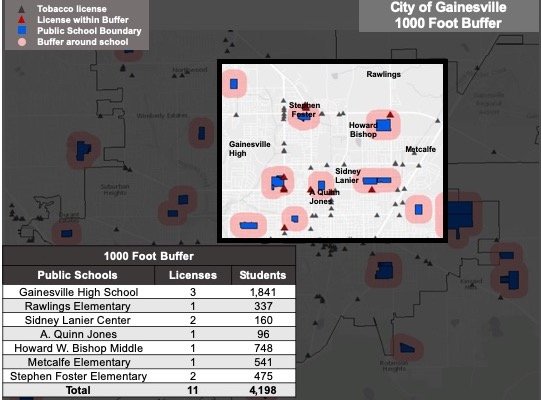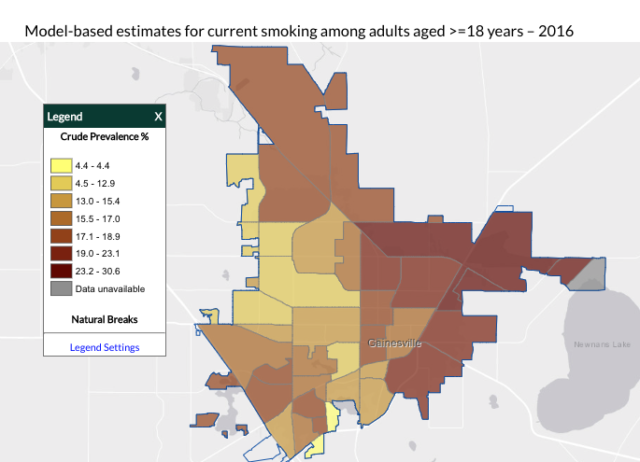Project Description
Overview
In January 2019, Alachua County implemented a local tobacco retailer licensing policy, raised the minimum legal sales age for tobacco to 21, and required any new tobacco retailers to be located at least 1000ft away from schools.
Since 2013, Florida Department of Health’s Bureau of Tobacco-Free Florida has partnered with Counter Tools to survey the retail environment and spread awareness around healthy retail, and in more recent years the work has shifted focus to passing policies.
Update: In May 2020, Senate Bill 1080 passed in Florida, raising the minimum legal sales age to 21, while also including preemptive language that prevents any policy at the local level that would address the age of sale or “marketing, sale, or delivery of” tobacco and nicotine products. The language unfortunately invalidates the existing Tobacco Retailer Licensing policy passed by Alachua County.
Despite being preempted, Florida has the opportunity to strengthen tobacco prevention and control efforts by tracking tobacco retailers, conducting tobacco retailer inspections, and doing checks to monitor tobacco Assurances of Voluntary Compliance (AVCs). Learn more in the Tobacco Point of Sale Preemption Playbook.
Background
After years of collecting data about the tobacco retail environment, Tobacco-Free Alachua understood that the current compliance check system was not covering all retailers each year. Implementing tobacco retailer licensing would allow local governments to better control how tobacco products were sold in their communities.
Tobacco retailer licensing would provide funds and a structure for visiting each retailer at least once per year. It would also give the county the ability to impose more meaningful penalties than warnings and fines. The threat of license suspension and/or revocation could lead retailers to make a greater effort to prevent underage sales and deter repeat violations.
Tobacco-Free Alachua also focused on youth access to tobacco products as part of the planning for policy changes. Discussion of Tobacco 21 began early on, as well as tobacco retailer proximity to schools.
While it was not originally a large part of the advocacy, the youth vaping epidemic continued to grow and drive political discussions. Adding licensing for e-cigarette retailers was an important step to protect young people from nicotine addiction.
Strategy
The Bureau of Tobacco-Free Florida launched a pilot program in 2017 that provided 12 counties with grant funding to pursue local tobacco retailer licensing. Alachua County was one of the counties selected, as its Department of Health already had a history of leadership on tobacco control issues.
Alachua County worked closely with independently-led local tobacco-free partnerships and coalitions. There were concerns about a conflict preemption with state law, and an attorney advised that the Alachua County Department of Health could not recommend the passage of Tobacco 21 laws. However, as private citizens, the members of the Tobacco Free Alachua partnership were able to do some of the advocacy work that Alachua County DOH was restricted from conducting.
“I remember discussing early on with one of our coalition chairs that DOH would only approve of us pursuing licensing, and that we would have to avoid any discussion of T21. In a way, this helped solidify the boundaries between our activities, and let us as staff focus on understanding the best practices mechanics of a license, while the volunteer coalition members embraced their role of being community champions building support for the policy.” – Andrew Romero, Tobacco-Free Alachua
Key partners also included Gainesville 4 All, Alachua County Healthcare Advisory Board, Local PTAs, the American Heart Association, and more. From each group they engaged with, the partnership leaders asked for support in some way – whether that was through a letter of support, an e-mail or call to county commissioners, or writing a piece for the local newspaper.
Throughout this work, Counter Tools provided the Bureau of Tobacco-Free Florida’s existing base of knowledge with training and message framing on why the retail environment matters and an increased understanding of tobacco retailer licensing and relevant strategies.
To make the case for tobacco retailer licensing across the county, different talking points were developed for different audiences, and significant efforts were made to reach out to rural communities. The campaign was also powered by ongoing conversations in the community, for example a recent report on racial equity in Alachua County.
“Mollie and Counter Tools were invaluable partners for us staff on our path to the TRL [Tobacco Retailer Licensing], and provided us much of the training and TA that served as the foundation of our team’s knowledge.”
Alachua’s DOH wanted to make sure they came up with a solution that wouldn’t require a lot of extra work on the part of the Alachua City Council. They provided technical support, data sharing, and a model policy that would help with administration and enforcement of the license.
Maps were created to help tell the story at a local level, including showing how many retailers would be impacted by each potential policy change, and telling the story of the east-west divide to highlight smoking inequities.
They were able to show maps of every K-12 school in Alachua County with the impacts of different types of buffer zones to show how many retailers would be affected by changes to distances from schools.

They focused on health equity, telling the story of the east-west divide in Gainesville. The east side has higher rates of smoking, whereas the west side has lower rates of smoking.

Alachua County employed a “show & tell” strategy to engage the public and make a visceral connection. Wendy Resnick noted that the whole reason she got involved in tobacco work was due to a presentation where the Tobacco-Free Alachua and DOH staff passed around grape flavored cigarillos for the audience to see.
“I’m not around people that use cigarillos, so it was like a switch going off going off in my head thinking about how evil tobacco is, trying to entice kids. From my perspective, the flavors are a big thing, but especially the marketing to kids.” – Wendy Resnick, Tobacco-Free Alachua
Results
In January 2019, Alachua County became the first place in Florida to implement a local tobacco retailer licensing policy, raise the minimum legal sales age for tobacco to 21, and require any new tobacco retailers to be located at least 1000ft away from schools. The new policy applies to all areas within unincorporated Alachua County, as well as to most of the cities within the county, including Gainesville. However, the cities of Newberry and High Springs decided to opt-out of the policy’s coverage. Alachua County was also the first county in the Southeastern US to implement tobacco retailer licensing at the local level.
Another success was including e-cigarettes in the tobacco retailer licensing policy. The state definition of tobacco product does not include e-cigarettes so the pre-existing state requirements for tobacco retailers did not apply to vape shops or other retailers that only sell e-cigarettes. Under Alachua County’s new ordinance, all retailers selling any type of tobacco product, including e-cigarettes, must apply for a county license yearly and pay a yearly licensing fee. Read the full ordinance here.
Next Steps
The ordinance took effect in October, 2019. The county decided on a 9-month roll-out period to allow for sufficient time to educate businesses on the new policies.
The Alachua County DOH took the initiative to contact other communities across the United States with similar tobacco retailer licensing policies and similar community characteristics to Alachua County to find best practices for retailer education, compliance checks, and the most effective ways to ensure compliance.
As pioneers in Florida, Alachua County is now also in a position to support other Florida counties that are hoping to pass their own tobacco retailer licensing ordinances. Counter Tools continues to check in with all counties in Florida working on point-of-sale tobacco control policies.
For more in-depth analysis of the Alachua County policy changes, view the full report on CounterTobacco.org.
Published June 8, 2020. Updated May 3, 2022.

